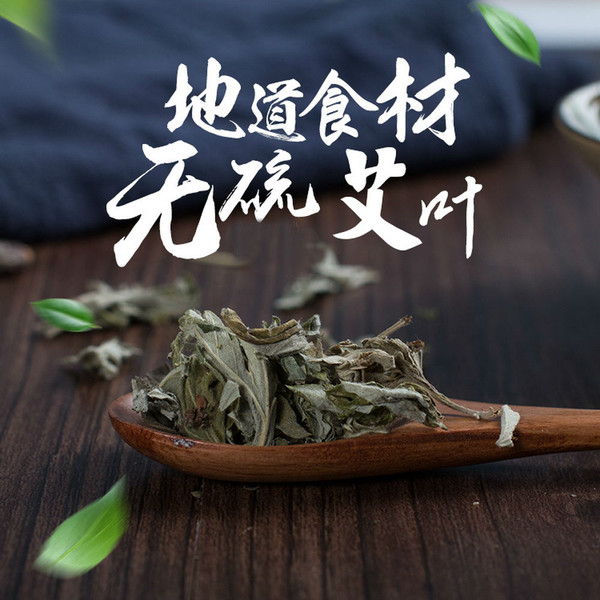Product Overview
Type: Herbal Tea
Packaging: Bag
Origin: China
Description: Mugwort tea has been in use for thousands of years in a number of different cultures, ranging from Europe to China, and has long been praised for its medicinal benefits. It was also the key ingredient in brewing beer for centuries before using hops came into favor. Scientifically known as Artemisia vulgaris, the mugwort plant is a tall shrub that is closely related to sunflowers, and its leaves, flowers and roots are all used for their nutrient content. The specific benefits of mugwort tea are mainly due to the presence of flavonoids, triterpenes and other antioxidant compounds, as well as vitamin A, vitamin K, vitamin E, potassium, iron, calcium and various B-family vitamins.
The main benefits of mugwort tea include its ability to ease menstrual pain, improve digestion, reduce anxiety and depression, promote dream retention, help with weight loss efforts, strengthen the immune system, detoxify the body and help regulate diabetes. Drinking mugwort tea is highly recommended for people suffering with insomnia, anxiety, painful menstruations, digestive issues, obesity, weak immunity, diabetes, depression, inflammation, colds, coughs, flu, respiratory infections and kidney problems.
Anxiety and Depression
With its powerful nervine qualities, mugwort tea is very good for treating anxiety, depression and chronic stress levels. This can help relieve stress on your nervous and metabolic system, and improve your quality of life if anxiety is something you experience on a daily basis.
Weight Loss
With a range of B-family vitamins in this herbal tea, you can significantly boost your metabolism and increase passive fat-burning. This can help with weight loss efforts and help your body operate at a higher level of energy and efficiency.
Indigestion
Mugwort tea has been used to settle the stomach and ease indigestion for generations. It can stimulate the appetite, reduce bloating and cramping, and counter unpleasant conditions like constipation and diarrhea. Some of the active compounds can also stimulate the production of bile, which can speed digestion.
Menstrual Pain
One of the major uses of mugwort tea is in the treatment of dysmenorrhea, more commonly known as menstrual cramps. It is also known to stimulate and regulate menstruation, and support the body as it changes through menopause. However, it should be avoided by women who are pregnant, as the stimulation of menses can cause miscarriage and trigger premature labor.
Diuretic Properties
The diuretic properties of mugwort tea mean that it stimulates urination, which is the body’s best means of eliminating toxins. Mugwort tea is also linked to cleansing the kidneys and bladder, reducing the chances of infection and improving function. It can also stimulate sweating, which will further eliminate toxins from the body through the skin.
Immune System
The high concentration of vitamin C and other active antioxidants makes this tea an excellent choice for boosting the immune system. The vitamin C can stimulate the production of white blood cells, and also act as an antioxidant, which can neutralize free radicals that cause inflammation and weaken the body’s defenses.
Vision Health
Vitamin A is found in mugwort tea, and acts as a strong antioxidant for vision health. More specifically, this beta carotene-derived vitamin is able to prevent macular degeneration and slow the development of cataracts.
Bone Mineral Density
Traditional beliefs hold that mugwort tea is an excellent mineralizer for the bones, helping to increase bone mineral density and preventing age-related bone disorders, such as osteoporosis. The high levels of potassium, iron and calcium found in this tea certainly help support this benefit.
Vivid Dreams
For centuries, mugwort tea was praised for its “psychic” and even “hallucinogenic” properties, and has long been used to stimulate vivid dreams. It is purportedly able to help you remember dreams as well, and experience those rare lucid dreams that are so few and far between.
Allergies – One of the most common triggers for hayfever is mugwort pollen, so allergic reactions to drinking this tea are not uncommon. If you are normally susceptible to allergies, use this tea in moderation, and if you experience any skin irritation, gastrointestinal distress, or swelling of the throat, lips or tongue, discontinue use immediately.
How to use: Ai Ye herb is used in the daily dosage of 3 to 9 g. In most cases, it is cooked in boiling water to make tea or soup for consumption.
1 ounce of dried mugwort, 4 cups of water (filtered), 1 teaspoon of honey or sugar, if desired. Bring the water to a boil and then add the dried mugwort. Allow the mugwort to steep for 5-10 minutes. Remove from heat and allow the mixture to cool for another 2-3 minutes. Strain the tea mixture. Add honey or sugar, if desired for sweetness, and enjoy!










